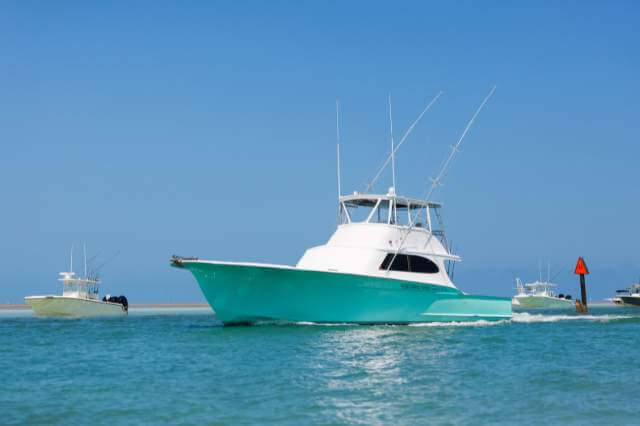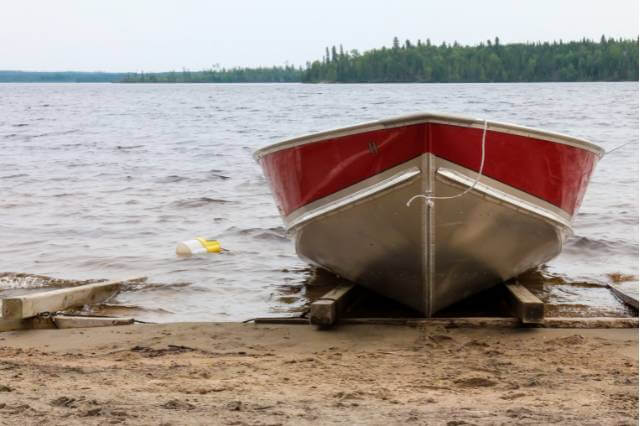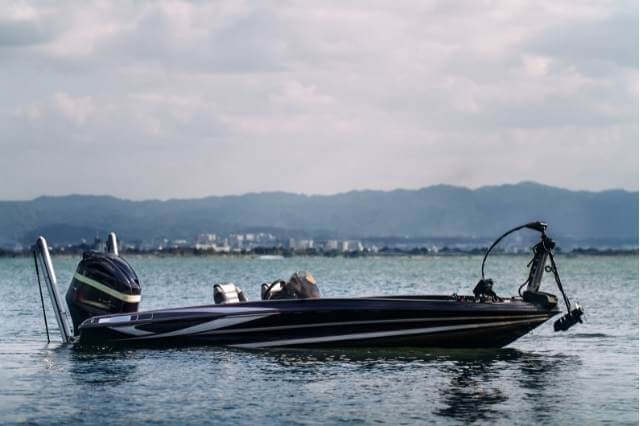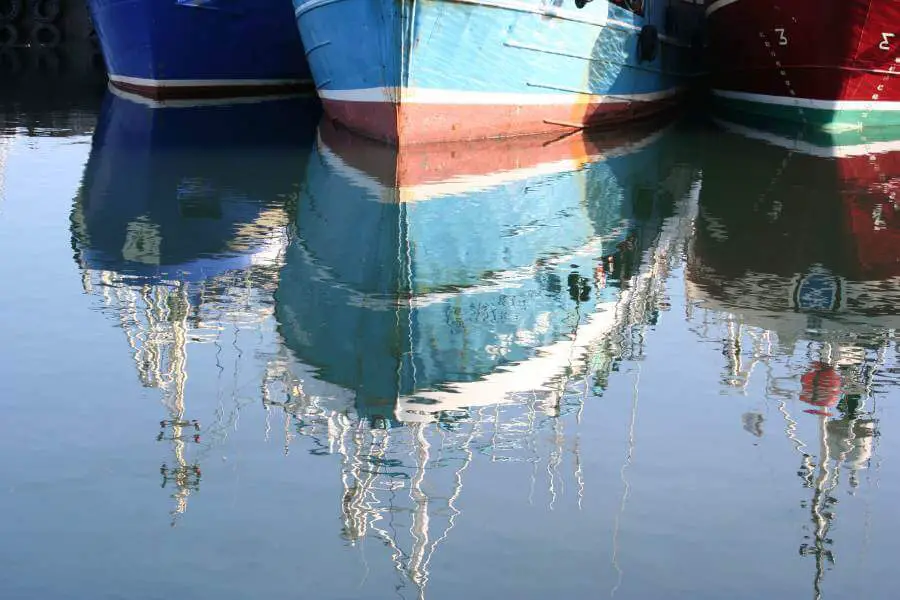I was curious whether some of the colorful bass boats stick out in the water to the point where fish seem uneasy or swim away, etc.
What color should a bass boat have in order to avoid affecting the fish you are attempting to catch? Or is there no significance to color at all?
Here are the results of some research I completed.
Table of Contents
Does Boat Color Matter for Fishing?
Fishing will not be impacted by the color of the boat; the hull color of the boat has no bearing on the quantity of fish you will catch.
The color of the boat is not as important to the fish as movement, noise, and shadows that don’t fit in well with their environment.
The color of the boat, therefore, has no bearing during fishing.
The deeper the water, the more often the colors start to fade.
The fish beneath your boat wouldn’t be able to see every color on the hull if it were a concern.
You generally don’t need to bother about the entire color-choosing procedure if you are fishing in deep seas that are 10 or 15 feet deep or deeper.
The color of your boat or clothes won’t really matter to their eyes in low light or at night, in heavily discolored or muddy water.
Although the color of the boat’s hull might be somewhat important in clear water, other factors such as movement and noise are more important.
They will often only be able to see the shape of the boat if it is above them.
The color of the boat makes a little impact to fish unless some light is reflected up toward the hull from the lake’s bottom.
If you’re fishing in shallow water, the color of your boat could make a small difference.
If the water is really clear—say let’s you can see 15 feet below—and you’re fishing vertically, you might want to think about using some light colors.
If not, dark colors will work just fine.
Finally, your chances of capturing more fish increase with how much you consider shadows, motion, and sound around you as well as how well you organize your approach.
Fishing won’t be impacted by the boat’s hull color.

As a Fishing Vessel, What Colors Work Best?
In actuality, boat colors won’t have much of an impact on fishing, although in some cases, the color of the hull does matter.
With that said, let’s explore what the ideal colors for a fishing boat are.
Camouflage, dark colors, and light colors in clear water are the greatest choices for a fishing boat.
However, the color of the boat won’t have much of an impact on the fishing, so it’s best to go with your preferences first, followed by considerations such as the type of lake, and others.
The boat color may make a small difference if you are fishing in really shallow water (under 5 feet), and if the water is exceptionally clear—say, you can see 15 feet below and you are fishing vertically—it is preferable to consider some light colors; otherwise, dark colors will work just fine.
However, it usually won’t make much of a difference.
Although some claim that white and other bright colors make fish less likely to startle by making them appear like clouds in the sky.
Others counter that anything will seem like a dark floating object from a fish’s perspective, proving that there is no clear winner in this argument.
According to Doug Hannon, a.k.a. “The Bass Professor,” who is well-known among anglers.
He said that the color camouflage is beneficial for fishing, and he mostly employed camouflage on all of his boats as well as his clothing.
Additionally, he added that dark colors are advantageous for a fishing boat.
Similarly, there is no certain boat color that can increase your fish-catching efficiency over other factors, such as your capturing method.
As a result, it is wise to follow your particular preferences rather than those of the types of waterways and settings you are fishing in.

Do Talking and Loud Noises Scare Fish?
We have all heard the advice to be calm while fishing in order to avoid scaring the fish at some point or another.
Even as adults, most of us take it to heart and keep our mouths shut when we’re out on the lake.
But does being quiet actually help you catch fish, or is it just your friend’s way of getting you to shut up?
I believe the solution is somewhere in the center as my knowledge of fishing increases and new scientific knowledge becomes accessible.
So, do chatting and loud noises interfere with your ability to catch fish?
YES and NO. Fish are rarely scared by loud conversation or music since these sounds do not easily permeate the water.
However, sounds like dropping pliers on a boat’s bottom, stomping on a pier, or a running boat motor might briefly frighten surrounding fish because they cause vibrations to travel through the water.
It’s Not So Bad to Talk
If you’ve ever gone swimming on a crowded beach where people are laughing and kids are yelling, you’ve probably noticed that soon you go under the water, and all the sounds get muted.
The reason for this is that because air and water have different densities, there is a barrier that prevents sound from passing through the water and returning to the air.
The majority of freshwater fish, including bass and trout, use lateral lines, sensory organs with pressure-sensing pores on their skin, to hear noises underwater.
Additionally, they possess otoliths, which are internal ears that transmit sound through bone.
Even some fish have swim bladders that can detect sound vibrations.
Shouting and chatting are not loud enough to startle adjacent fish, not even with enhanced hearing.
Because of how busy it is below the surface, most noise from above is drowned out and goes unheard.
The majority of fishermen would concur that casual conversation and the odd “whoops” of enthusiasm from capturing fish won’t affect your fishing results.

Avoid Making Any Waves in the Water
Sound is not a huge concern above the surface of the water, but once you breach the surface, everything changes.
Fish can quickly detect vibrations from activities like dropping an anchor with a splash, wading through a river, and even pushing themselves too far on a pier.
Since sound travels through water nearly five times as quickly as it does through air, any noise that reaches fish is significantly louder.
When close splashes or intense vibrations startle eating fish, they may briefly shift into flight mode and stop biting.
According to my experience, fish will quickly resume their typical eating habits.
In fact, occasionally a splashing disturbance actually agitates nearby fish.
This frequently happens when a fish that has been hooked struggles and attracts other fish trying to take advantage of the seeming feeding frenzy.
It’s difficult to predict what may startle fish or cause a sudden feeding frenzy, but it’s always preferable to avoid immediately agitating the water.
Final Thoughts
The quantity of fish you will catch when fishing is unaffected by the color of your boat.
Fish are more likely to notice movement, noise, and shadows that stand out from their environment than an odd boat color.
Therefore, the color of the boat won’t scare off the fish, causing you to capture fewer fish.
Further Reading:

